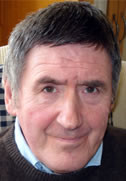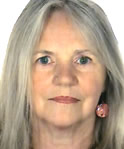Living with Aphasia
Read how aphasia has affected the lives of two people - the first a person living with aphasia and the second the wife and carer of a person with aphasia.
A person living with Aphasia
 After the mind bending storm of the first six months of suffering with the effects of a stroke, you find out that you are suffering with a condition known as aphasia.
After the mind bending storm of the first six months of suffering with the effects of a stroke, you find out that you are suffering with a condition known as aphasia.
This describes your lack of ability to communicate, to concentrate, to spell, to be numerate, to read, and to write. Every stroke patient feels this to a different degree.
Some of my colleagues have found that they cannot read at all. They can only concentrate on one word at a time making their reading hopeless. They start a sentence and get lost before they are over the first three words. The best amongst them start with “Janet and John” or another first learner and with several months work get back to their newspapers.
You can imagine how one who finds it difficult to read also finds it difficult to write. This is true for myself, but mainly because of my physical disability with a right sided impairment. I find my right hand is useless when I have to write. I find that a word processor is fine using my left. I can write left handed when it comes to writing a cheque.
Writing down numbers is very difficult for some colleagues. Answering a telephone is also very difficult especially when it is unknown who will be on the other end of it. Making a call can be difficult.
Reading books has become a bigger hobby since my stroke. It is evident that I can read and I am so pleased that I can. Some other hobbies have had to change for example I cannot play 5 aside football any more but I still meet the lads for an hour on Friday nights. I have taken up gardening, listen to music, paint a bit and use the internet but my biggest sense of pride comes from being next to my carer.
We have been on a tall ships adventure, an abseil, an escalator in a shop, learnt to drive a car again and have travelled by plane. These have given me hope. I am in the second year of learning Spanish where I have the dull thud of not remembering names along with trying to get to grips with writing them down.
There is a lot to be said for Newcastle and NETA and the students and friends there who have helped me to get my life back.
Mick Ruddy
The wife and carer of a person with Aphasia
I really can’t think of myself as carer of my husband who suffered a huge stroke almost 8 years ago, although we both know that in so many ways I am - its more of a bit of a shift in the way we go about things. We have got so used to it now that it is sometimes hard to remember that world we lived in prior to the event.
 We have come so far since those very dark days when all was shock, fear, grief and gloom. The endless hospital worries and the enormity of the changes that had to be understood, accepted and built upon.
We have come so far since those very dark days when all was shock, fear, grief and gloom. The endless hospital worries and the enormity of the changes that had to be understood, accepted and built upon.
Mick was 57 when it happened, academic, successful, fit, sporty, enjoying life and looking forward to a good few more years work before a retirement travelling together and enjoying our lovely grandchildren. His life, our lives, changed in the blink of an eye.
Those first few weeks he was very distressed, being unable to speak or move his right side, but having been so close for 36 years we communicated in the knowing ways that couples grow into and still rely a lot on our vast treasure of joint past experiences to unravel tricky moments in conversation. In the company of others it wasn’t always so instinctive - for example the lovely tea lady at the hospital would happily heap spoonful after spoonful of sugar into Mick’s tea because he managed ‘yes please’ but hadn’t yet got to grips with ‘no thanks’ – and this 'yes/no' confusion still exists, though he has now mastered a degree of self correction. There are many anecdotes of a similar nature that I recall, but most too painful even after 8 years, to share.
One day his O,T. asked what were his goals and I can still see the look of shock and disbelief on her face when, with my help, he struggled to reply that he wanted to travel and to learn a foreign language.
When he was well enough, Mick’s speech therapist at Carter Bequest Hospital in Middlesbrough suggested that intensive help at the Aphasia Centre in Newcastle might be of benefit. Attending for assessment there was the major turning point for us both. It was a huge commitment travelling 40 miles from home 3 days a week for 12 weeks but how grateful we both are that he was given this opportunity. There we met other people in the same life-changing predicament, all at different levels of recovery, all with different experiences and stories to share. To this day there remains a strong bond of trust and friendship between us all.
Expert help from staff and students at The Centre has given Mick confidence to overcome some of the complex communication problems he faces every day - and at home, good friends who see beyond the problems and who continue to include and engage Mick in real conversation have kept our feet on the ground.
A stroke is just such a terribly cruel thing to happen and yes, things are very different now … but still good. We have made so many new and lovely friends, plan always to have something to look forward to and holiday more than is respectable. Mick’s love of reading and commitment to learning continue to play a huge part in his life. On announcing that he wanted to try his hand at evening classes, I wasn’t at all sure he would cope …… but he proved me wrong and came out a year later clutching his Yacht Master’s Certificate. And now it’s learning Spanish that keeps his interest and his teacher is just great. We’ll think of something to do after this too!
Doors close, indeed they slam shut ….. but windows open!
Sue Ruddy
If you live in the North East why not contact NETA about attending our Support Centre, which provides ongoing support and well being. More information can be found by clicking here.



 Back to top
Back to top